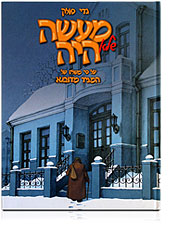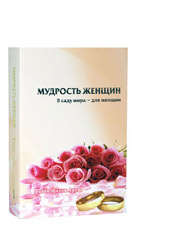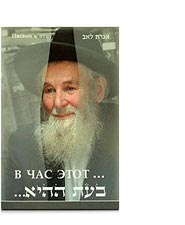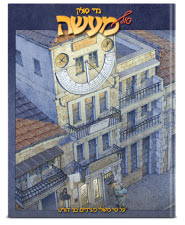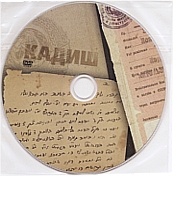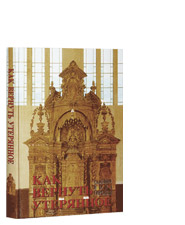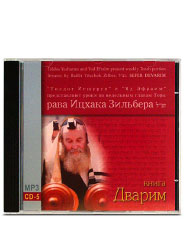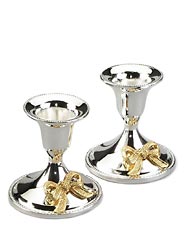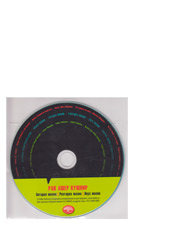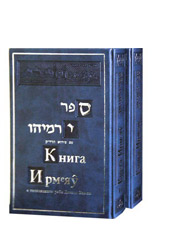
A Free Man in Work Camp
A Free Man in Work CampRav Yitzchak Zilber did not go to school as a child. He acquired all his knowledge from his father, in Russia. Fifty years ago he was arrested and incarcerated in a work camp for three years — but he continued to keep the mitzvot. In one of the books he authored, he tells of a special Pesach that he celebrated under the shadow of forced labor.
When I arrived at the home of Rav Zilber in Jerusalem ’s Sanhedria Murchevet neighborhood, I found him in the midst of a conversation with a Russian-Jewish couple who were new immigrants to Israel . Rav Zilber himself came to Israel from the Soviet Union twenty-two years ago. He refused to accept a rabbinical position and began to teach mathematics in the yeshiva high-school Kiryat Noar in Jerusalem . He also volunteered his time to assist women who were stranded without their husbands (agunot), and to teach Torah classes.
He owes his extensive Torah knowledge, as well as his general knowledge which includes mathematics and physics, with which he graduated from university with honors, to his father. “He was my personal rabbi,” says Rav Zilber. “He taught me everything.” His father did not want to send him to public school so he would not have to desecrate Shabbos, so he taught him Russian, mathematics, and general studies, to the extent that their non-Jewish neighbors who spoke with his son did not suspect that he was not studying in school. “I did not study a single hour in school,” he recounts.
He preferred to use his time for Torah learning. “But,” he says, “I began to ask myself what is more important to HaShem: that I will learn more Gemara, or that Jews who know nothing will begin to believe in their Creator.”
“ They Fabricated a Case Against Him ”
A year ago Rav Zilber was hospitalized, when he was already over eighty years old, with severe cardiac problems. Together with a group of close students he decided to establish the organization called “Toldos Yeshurun” to assist immigrants from the former Soviet Union . Russian-speaking Kollel graduates meet for joint learning sessions with new immigrants from the former Soviet Union who want to become acquainted with Judaism. Upon deciding to establish the new organization, Rav Zilber’s health improved dramatically and he returned home, ardently devoted to build the organization.
He authored a number of books in Russian. In his book titled “Sichos Al HaTorah,” he recounts celebrating the festival of Pesach fifty years ago in the work camp located in the central Russian city of Kazan . The official explanation for his arrest was illegal trade in government bonds. “The truth is that they fabricated a case against him,” explains one of his students. “A mathematics teacher in a communist school, who was also a believing Jew, apparently was disapproved of by the authorities.”
In jail his task was to draw water for the camp. In order not to desecrate Shabbos, he took upon himself the entire job of supplying water and did not divide the work among other prisoners. On Erev Shabbos he would carry water until sunset, and from three-o-clock on Shabbos afternoon, after the water that he had stored on Friday was finished, he would ask a non-Jewish prisoner to bring water, for pay.
When Pesach appeared on the horizon Rav Zilber started to plan his preparations for the festival. He firmly decided that even in imprisonment he would not eat chametz on Pesach. Not all the Jewish prisoners shared his opinion. Among the prisoners were several members of ‘Yevsectzia,’ the Jewish communist party. They were sworn to fight Judaism to the bitter end, and were possessed by a ferocity that would not shame even the non-Jewish communists. Rav Zilber tried to convince them. “I am not promising that you will get out of jail early,” he said to them, “but I promise that you will not lose anything by not eating chametz.” This was not an easy matter to arrange: bread was distributed in the camp in meager amounts that did not satisfy the prisoners’ hunger.
Elijah the Prophet as a Tatar Police-Chief
The difficult task of obtaining matzah flour was taken on by his wife (who has since passed away). She stood in line for many hours with her two small children and obtained fifty-five pounds of flour. In order to obtain such an amount she had to stand in several places in order not to arouse suspicion. She had to bake the matzos in hiding, because someone who was caught baking matzos was sent to jail. She baked the matzos, put them on her sled, and started walking home. A Tatar policeman stopped her and asked what she had on the sled. She answered that she was bringing cakes for the birthday party of her daughter, but the large amount did not convince the policeman and he whistled for help. A Tatar police-chief arrived. After the two men exchanged a few sentences the police chief waved his hand to the her, signaling her to go. She later told her husband that Elijah the Prophet had appeared to her in the guise of a Tatar police-chief.
She broke the matzos into little pieces that were designated as ‘teacakes,’ and she brought them wrapped in a package. Rav Zilber saw to it to acquire potatoes as well from some of the camp’s known thieves. The question of where to cook was yet unsolved, as was the question of where to find cooking utensils. He managed to find a pot and cleaned it with snow and sand. A prisoner named Mishka Kosov, who held the other prisoners in terror, approached him. Rav Zilber knew Kosov as the leader of the gang of thieves in the camp, and a complete non-Jew. Suddenly Kosov began to speak to him in Yiddish: “I see that you are making efforts not to eat chametz,” he said to him. “I also am a Jew; I will be with you too.” Kosov continue to surprise Rav Zilber. He took out a hundred rubles, gave them to Rav Zilber, and asked him to send the money to his wife to buy kosher chicken for Pesach.
Finding a place to cook also required creative thinking. The prisoner responsible for heating in the camp was a terrifying man. He would sell toast to the prisoners. Over the course of several days Rav Zilber bought toast from him and thereby developed a relationship. In return for some potatoes, he got permission from him to use the stove for cooking.
A Seder in the Clinic, and Raisin Wine
The main thing that worried him was that the food they had prepared for Pesach would be stolen. For each eight prisoners there was a little cabinet divided into compartments, but experience had shown Rav Zilber that it was impossible to leave anything valuable there. The night he arrived at the camp they stole his shoes, and the second night they cut a piece out of his winter coat. From then, until he was released from jail three years later, he slept with all his possessions in hand. Here Mishka Kosov surprised him again. He gathered all the thieves and informed them: “For eight days it is forbidden for you to ‘ask’ anything from Yitzchak Zilber. Whoever does not obey will find himself headless.” The warning proved effective.
The camp physician, a Jew who had a non-Jewish wife, also agreed to cooperate. He gave the Jews access to the clinic on Seder night. “We sat and spoke and I said over words of Torah; we did everything properly,” recounts Rav Zilber. “If I fulfil HaShem’s mitzvot properly, then I am a free man. We taught the prisoners to say ‘Pesach, Matzah, and Maror.’ Also Mishka Kosov was there, and he really liked the wine made from raisins,” he laughs. It was a true feeling of freedom.
On the eighth day of Pesach, the second day of Yom Tov as is kept in the Diaspora, there were no matzos left. Hunger increased. One of the prisoners said to Rav Zilber: “I can’t wait any longer. In Israel they are already eating chametz. I want to as well.” Someone recalled that on the last day of Pesach the Yizkor prayer is recited, and asked Rav Zilber to recite the prayer with him so he would not eat chametz before he prayed for the souls of his departed parents. A different Jewish prisoner, member of the ‘Yevsectzia’ party that had closed down the synagogue in his town and sent the town’s mohel to jail, and who on Pesach did not even bother to eat matzah, asked Rav Zilber to recite ‘Yizkor’ for him. His parents had warned him not to dirty their names by reciting it with his own mouth. After the prayer the prisoner took out butter and salted fish that he had received in a package. “Whoever did not eat chametz on Pesach may eat,” he announced. Rav Zilber remembers the taste of that butter to this day.
The Death of Stalin
Rav Zilber recounts that after his release, a number of prisoners—among them a KGB agent that spent twenty-five years at his job—decided to divorce their non-Jewish wives and marry Jewish women instead. Here the influence of Rav Zilber’s Torah classes was felt.
He remembers a time when his faith almost reached prophecy. On Purim of 5713 there was no kosher megillah to be found, and Rav Zilber gathered together some Jews and told them over by memory the story of the megillah. “One of the prisoners almost attacked me,” he recounts. “He shouted: ‘Why are you telling a story about what happened over two thousand years ago! I want to know where is G-d today. The six million martyred Jews are few compared to what is going to happen to Russian Jewry. Soon they will be sent to Siberia , and the Jews will turn to dust.’”
The background to his outburst was the atmosphere of anti-Semitism that engulfed the Soviet Union following what was known as the ‘Doctor’s Trial.’ In 1948 a group of leading Jewish doctors were accused of killing the head of the communist party and attempting to assassinate Soviet leaders, among them Stalin himself. The doctors were accused of connections with ‘JOINT,’ an American-Jewish organization which was suspected of spy activities. Coverage of the trial appeared in the official newspapers of the Soviet Union and led to rumors that expulsion of the Jews was being planned.
Rav Zilber continues: “I said that I know the situation is serious but I believe that nothing bad will happen. It is written: ‘Trouble does not come twice,’ and our generation lost six million people, it will not happen a second time.” The Jew was not convinced and claimed that Stalin is planning to exile them all to Siberia . He argued that in his experience, whatever Stalin plans is executed: from turning the farmers of the Soviet Union into state employees, to killing millions of citizens who opposed his regime, to achieving victory in war.
“He succeeded against everyone,” answered Rav Zilber, “but against the Jews he will not succeed. Stalin is no more than flesh and blood.” He said his last few words in Hebrew and then translated them into Russian. “As long as the blood circulates, a person is alive. When the blood stops to circulate, he is dead. A person cannot know what will happen to him even half an hour from now.” The Jew became livid with rage, spit, and left. The time was ten minutes to eight.
Next morning Rav Zilber went to draw water as usual. The man that had argued with him the previous morning came up to him. “You said something good yesterday,” he told him. Rav Zilber asked him what he meant. He revealed the news that had rocked Russia : “Yesterday at eight twenty-three , Stalin collapsed due to a brain hemorrhage. Half an hour after we spoke. It seems that a person indeed cannot know what will happen to him even half an hour from now.” Rav Zilber began saying tehillim and stopped after twenty-four hours, when it became known that Stalin was dead. After Stalin was buried people told him: “Yitzchak, you are right.”




